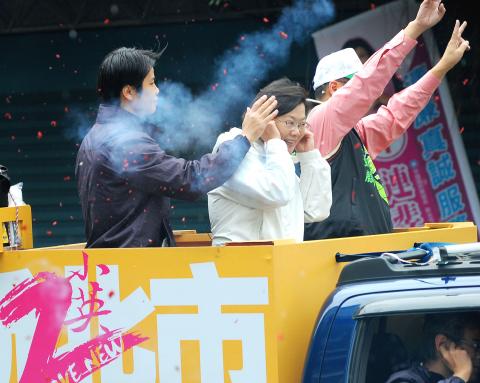Both Sinbei City mayoral hopefuls yesterday suggested that a near meet-up between their entourages was unsurprising, given that they have both ramped up their election events as part of campaign frenzy four days before Saturday’s elections.
Accompanied by firecrackers and watched by scores of spectators, their motorcades and dozens of supporters came within several city blocks of one another in tightly fought Yonghe (永和), part of Taipei County, which will be renamed Sinbei after its upgrade to a special municipality next month.
Smiling and waving to supporters, Chinese Nationalist Party (KMT) candidate Eric Chu (朱立倫) and Democratic Progressive Party (DPP) candidate Tsai Ing-wen (蔡英文) both stood in open-top jeeps leading motorcades stretching for dozens of meters.

PHOTO: CNA
Rain or shine, they said, they would make a last minute appeal to voters throughout the municipality, the country’s most populous.
Concerns over a clash were avoided after the two campaigns apparently agreed on a roadmap that avoided overlap, an issue that will grow more important as the two candidates are expected to meet again in Banciao (板橋) the day before the elections.
“It was a coincidence and it’s also another coincidence that we will meet again in Banciao. After all, we plan these events one or two weeks in advance,” said Chu, speaking of yesterday’s near miss.
Tsai agreed, adding that both camps likely chose Banciao as the site of their final election rallies on Friday because it is the seat of the county government.
“It’s the political and economic center of Taipei County and it will remain [so] for Sinbei City in the future,” she said.
The near meet-up took place just hours after Chu launched a new volley of criticism against Tsai’s campaign, attacking it for “masterminding an underhanded” letter campaign to sway voters through what he says are false accusations.
His campaign alleged that over the last two weeks, some residents have received documents alleging that Chu halted an old-age subsidy during his eight-year tenure as Taoyuan County commissioner and that he allowed factories to dump polluted water in Taoyuan rivers.
Speaking of the letters, signed by officials at Tsai’s campaign and a number of DPP city councilor candidates, Chu said he hoped Tsai, a former legal professor, “could maintain a scholar’s conscience and refrain from such actions.”
“[Unfortunately], the DPP has a history of using negative [attacks] in the last few days of any election ... I’m sure that it will happen again” before the election, he said, suggesting that Tsai could not prove her campaign’s allegations.
Officials at Tsai’s campaign have said that Chu’s campaign, which has filed a lawsuit over the documents, should respond truthfully to their assertions because their material is clearly sourced and signed. On the charges that Chu halted the old-age subsidy, the document is also signed by two DPP legislators, Kuo Jung-tsung (郭榮宗) and Huang Jen-shu (黃仁杼).

Taiwan is stepping up plans to create self-sufficient supply chains for combat drones and increase foreign orders from the US to counter China’s numerical superiority, a defense official said on Saturday. Commenting on condition of anonymity, the official said the nation’s armed forces are in agreement with US Admiral Samuel Paparo’s assessment that Taiwan’s military must be prepared to turn the nation’s waters into a “hellscape” for the Chinese People’s Liberation Army (PLA). Paparo, the commander of the US Indo-Pacific Command, reiterated the concept during a Congressional hearing in Washington on Wednesday. He first coined the term in a security conference last

Prosecutors today declined to say who was questioned regarding alleged forgery on petitions to recall Democratic Progressive Party (DPP) legislators, after Chinese-language media earlier reported that members of the Chinese Nationalist Party (KMT) Youth League were brought in for questioning. The Ministry of Justice Investigation Bureau confirmed that two people had been questioned, but did not disclose any further information about the ongoing investigation. KMT Youth League members Lee Hsiao-liang (李孝亮) and Liu Szu-yin (劉思吟) — who are leading the effort to recall DPP caucus chief executive Rosalia Wu (吳思瑤) and Legislator Wu Pei-yi (吳沛憶) — both posted on Facebook saying: “I

Sung Chien-liang (宋建樑), who led efforts to recall Democratic Progressive Party (DPP) Legislator Lee Kun-cheng (李坤城), was released on bail of NT$80,000 today amid outcry over his decision to wear a Nazi armband to questioning the night before. Sung arrived at the New Taipei District Prosecutors’ Office for questioning in a recall petition forgery case last night wearing a red armband bearing a swastika, carrying a copy of Adolf Hitler’s Mein Kampf and giving a Nazi salute. Sung left the building at 1:15am without the armband and covering the book with his coat. Lee said today that this is a serious

The Ministry of Economic Affairs has fined Taobao NT$1.2 million (US$36,912) for advertisements that exceed its approved business scope, requiring the Chinese e-commerce platform to make corrections in the first half of this year or its license may be revoked. Lawmakers have called for stricter enforcement of Chinese e-commerce platforms and measures to prevent China from laundering its goods through Taiwan in response to US President Donald Trump’s heavy tariffs on China. The Legislative Yuan’s Finance Committee met today to discuss policies to prevent China from dumping goods in Taiwan, inviting government agencies to report. Democratic Progressive Party Legislator Kuo Kuo-wen (郭國文) said